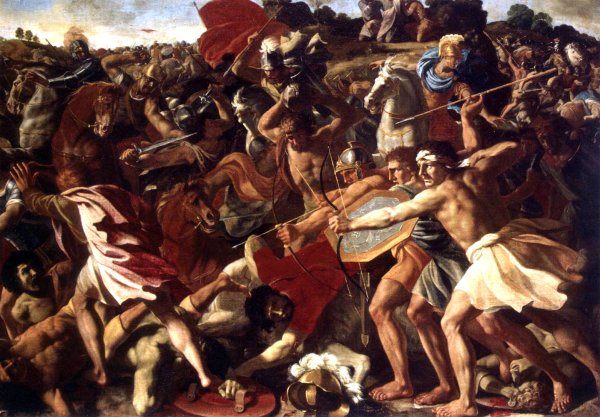If God is real, argue the atheists, then He would be Omniscient, Omnipotent and Omnibenificient; and as such, He would not slaughter millions of people (as in the flood), He would not command the genocide of entire groups of people, and He would not condemn people to an eternal torture in hell simply because they do not follow or believe in Him. If such a God exists that does all of these things, then He is not worthy of worship, praise, or followers.
While at first glance this argument seems both logical and sound, it is based on assumptions and presuppositions that are not necessarily true. Let's look at the basic premises of this argument.
Premise #1: If God is real, He would be all-knowing, all-powerful, and all-loving.
Premise #2: If God is all-knowing, all-powerful, and all loving, then He would neither slaughter innocent people, nor would He command or allow the slaughtering of people.
Premise #3: God has both commanded the slaughter and Himself slaughtered millions of people throughout history.
Conclusion: God is either not real, or, if He is real, He is not worthy of worship, praise, or following.
As I pointed out, it is based on assumptions and presuppositions. The presuppositional bias of the atheist is that there is no God. Therefore, every one of his arguments is based on that presupposition, and that, in turn, causes the atheist to make assumptions that are not based on an accurate view of God. In this situation, God is assumed to be all-knowing, all-powerful, and all-loving. And He is. However, He is much more than that. God is also all-holy, all-righteous, all-just. He is the epitome of these various attributes, the standard of measure for them you might say.
In the argument posed by the atheist, he leaves these other attributes out of his description of God, thus describing a god that is not the God of the Bible, and then arguing against the god of his creation. This is a typical straw man argument posed by atheists.
Additionally, in order to make this argument, the atheist must ignore both the immediate context of the passage(s) he uses to support his argument (usually Genesis 5:32-10:1 [the Noahic flood], 1 Samuel 15 [the Amalekite genocide], Numbers 31 [the Midianite massacre] – there are others, but these are the most common), and also the overall context of the passage(s).
In taking these passages out of their proper context, the atheist implies in his argument that God's actions in these instances was arbitrary and capricious, the actions of a petulant 5-year old burning ants with a magnifying glass (as one atheist put it), rather than a loving God. The reality of these situations as clearly presented within the context of the passages, however, presents a completely different story.
As noted above, while God is all-loving, He is also completely holy, just and righteous. He is the one who established those character attributes. In other words, He defines morality. He determines what is holy, just and righteous, and what is not. He determines what is right and good, and what is wrong and evil.
In every instance noted in the “genocide” passages brought up by atheists to support their premises, those who were killed were not killed simply because God woke up in a bad mood and decided to kill a bunch of people. There was no capriciousness involved in God's decisions. There was justice. Those who were killed were suffering the wrath of a righteous holy God who had allowed them every opportunity to stop their evil and repent of it. But they chose not to. Instead, they made the conscious decision to continue living in the most based of depravities. They were, in each instance, wantonly engaging in the most wicked of sins. They were engaging in rampant idol worship, prostitution (that involved children), pedophilia, rape, bestiality, homosexuality – including ritualistic homosexuality with children, drunken orgies, and child sacrifice which involved the burning alive of babies and toddlers.
These people were warned by God to stop living in wanton, gross sin; and, they were warned for years – for 120 years in the case of the Noahic flood. They knew what they were doing was displeasing to God, they knew what the ultimate consequence would be, and yet they either chose to ignore the warnings, or they chose to not believe in God, thus rejecting Him out of hand. And, they continually tried to involve the Israelites – the people of God – and corrupt them as well. In many cases they succeeded, and in those cases the Israelites suffered the same consequences. As Jonathan Edwards pointed out in his sermon of the same name, it is a terrible thing to fall into the hands of an angry God!
As we all know, there are consequences for every decision we make. Sometimes those consequences are good, sometimes neutral, and sometimes decidedly less than pleasant. And the degree of our actions often determines the degree of the consequences we face. In the case of those who fell under God's wrath, the sins were not the sins of some of the people in those groups, but rather involved sins on a national level. Virtually everyone in those groups were engaged in those sins, and God judged them as nations, as well as individuals. This is what He has historically done with nations whose sin is so rampant and so wicked among the inhabitants of those nations or people groups.
And what about those who were part of those nations and people groups who were not involved in the sin of their nation or people group? As shown in numerous examples in Scripture, God removes them from the coming wrath, thus sparing them. Noah and his family, Lot and his family, the Israelites spared the plagues, The Babylonian captivity and the destruction of Jerusalem, Rahab, Esther, and so on are all examples of God sparing His people from destruction by removing them from the situation.
Thus, the atheist argument is, as has been shown, a straw man argument, and not a valid argument against God. More importantly, however, is the lesson clearly shown in those instances when God, in His ultimate holiness, righteousness and justice, endures the sins of man for just so long before man stands condemned as a result of his sin; and as can also be seen, the degree of sin seems to also have an impact on the timing of God's wrath. The more depraved an individual or nation becomes, it seems the sooner God's wrath comes and calamity ensues.
Of course, regardless of whatever wrath a sinful man or a sinful nation faces temporally, there is still the coming judgment, and those who continue to remain in their sin and continue to remain in their rejection of God, will face eternal judgment for their choice. Food for thought.


 RSS Feed
RSS Feed
